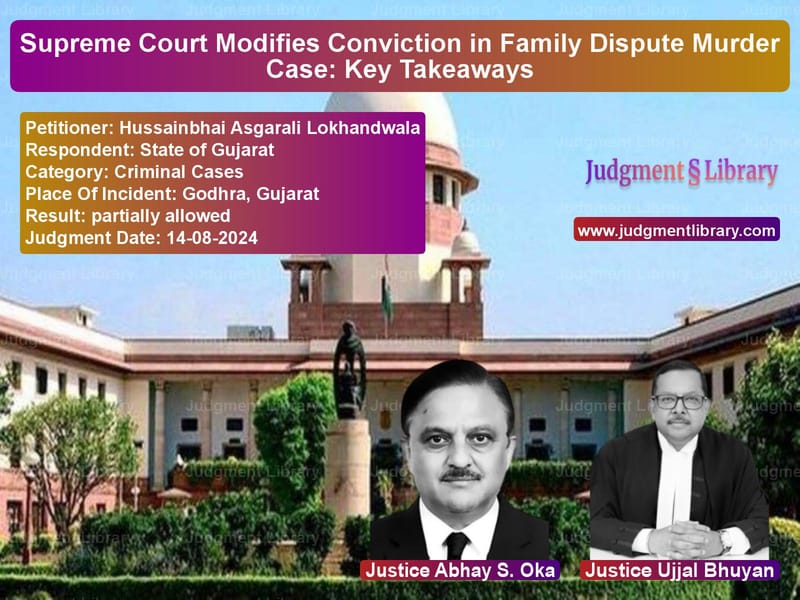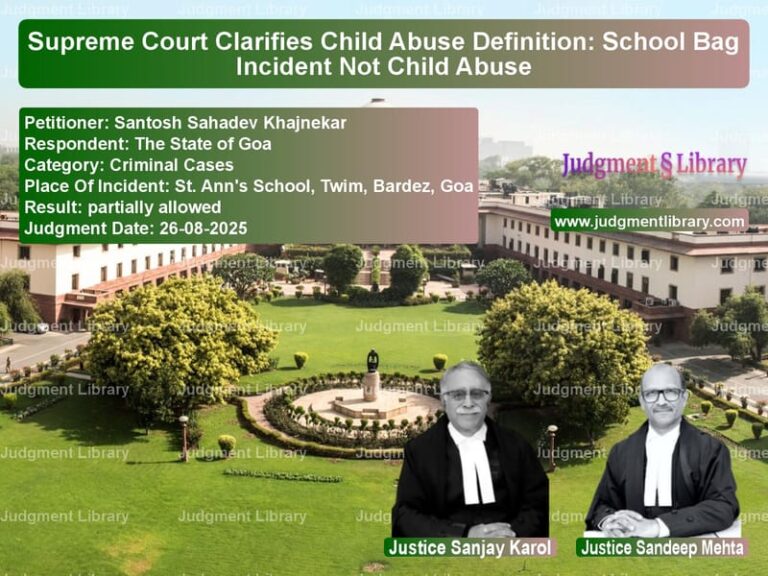Supreme Court Modifies Conviction in Family Dispute Murder Case: Key Takeaways
The Supreme Court of India recently delivered its judgment in the case of Hussainbhai Asgarali Lokhandwala vs. State of Gujarat, addressing a complex family dispute that escalated into violence, resulting in the death of Idrishbhai Fidaali Mithiborewala. The case revolved around a long-standing matrimonial conflict, leading to a confrontation in which the deceased was fatally stabbed. The Court modified the conviction from Section 304 Part I IPC to Section 304 Part II IPC, significantly reducing the punishment of the appellant.
Background of the Case
The case originated from a family altercation that took place on November 7, 2000, in Godhra, Gujarat. The dispute was between the families of the victim, Idrishbhai Fidaali Mithiborewala, and the appellant, Hussainbhai Asgarali Lokhandwala. The conflict arose when Abbasbhai, son of the deceased, attempted to bring his wife, Onejaben (daughter of Asgarali Lokhandwala), back home from her parental house. The refusal led to a heated argument between the two families, culminating in a physical altercation.
Incident Details
According to the prosecution:
- Abbasbhai went to his father-in-law’s house to request that his wife return home. However, her father, Asgarali Onali Lokhandwala, refused.
- A verbal argument escalated into a physical fight.
- The deceased, Idrishbhai, arrived at the scene, attempting to intervene.
- During the scuffle, Hussainbhai Asgarali Lokhandwala stabbed Idrishbhai in the stomach.
- Another family member, Gopi, was also injured while trying to protect Idrishbhai.
- Idrishbhai succumbed to his injuries while being treated at the hospital.
Trial Court Verdict
The Sessions Court, in its verdict on November 7, 2006, convicted both Hussainbhai Asgarali Lokhandwala and his father, Asgarali Onali Lokhandwala, under:
- Section 304 Part I IPC – Punishment of five years rigorous imprisonment and a fine of ₹50,000.
- Section 323 IPC – Seven days imprisonment.
- Section 324 IPC – Two years imprisonment.
The Court directed that ₹90,000 from the fine amount should be paid to the victim’s family as compensation.
Appeal in High Court
The convicted individuals challenged the trial court’s decision in the Gujarat High Court. The High Court partially modified the judgment on May 6, 2016, by altering the conviction from:
- Section 304 Part I IPC to Section 304 Part II IPC.
- Sentence for Asgarali Onali Lokhandwala was reduced to the period already undergone.
- Hussainbhai’s sentence remained at five years rigorous imprisonment.
The victim’s family also filed an appeal demanding that the conviction be enhanced to Section 302 IPC (murder), arguing that the act was premeditated.
Arguments in Supreme Court
Appellants’ Arguments
Hussainbhai’s defense, represented by senior counsel, argued that:
- The incident occurred in a heat of the moment without premeditation.
- The deceased and his family members were the aggressors and had come to the appellant’s home to take Onejaben forcefully.
- The knife used was a kitchen knife, not a weapon intended for murder.
- The appellant was only 18 years old at the time of the incident.
- He acted in self-defense to protect his family from an aggressive confrontation.
Respondents’ Arguments
The State of Gujarat and the victim’s family countered these claims:
- The deceased was unarmed and posed no immediate threat.
- The act of stabbing was intentional, targeting the stomach, a vital body part.
- The crime was not an accident but an act of aggression.
- The family of the accused had a history of hostility towards the deceased.
- The conviction should be enhanced to Section 302 IPC.
Supreme Court Observations
The Supreme Court thoroughly examined witness statements, medical reports, and the sequence of events before delivering its final verdict. The Court noted:
- The attack was not premeditated but occurred due to a sudden escalation of an existing dispute.
- There was only a single stab wound, which indicated it was not a planned murder.
- The altercation started as a domestic dispute and spiraled out of control.
- The appellant was young and acted out of family loyalty and emotional distress.
- The use of a kitchen knife, rather than a deadly weapon, supported the argument that there was no premeditation.
Final Verdict
The Supreme Court delivered its judgment on August 14, 2024, ruling:
- The conviction under Section 304 Part II IPC was upheld.
- The sentence of five years rigorous imprisonment was modified to the period already undergone.
- The appellant, Hussainbhai Asgarali Lokhandwala, was ordered to be released immediately if not required in any other case.
- The compensation fine remained intact.
Legal Precedents Cited
The Supreme Court referred to previous rulings to justify its decision:
- Sukumaran vs. State (2019) – Emphasizing self-defense and the distinction between premeditated murder and sudden altercations.
- Rajinder Singh vs. State of Punjab (2015) – Establishing the necessity of proving intent beyond reasonable doubt.
- State of Madhya Pradesh vs. Jogendra (2022) – Highlighting factors that distinguish culpable homicide from murder.
Implications of the Judgment
The ruling has significant legal implications:
- Clarifies legal distinction: The judgment reinforces the difference between premeditated murder and acts committed in a sudden emotional reaction.
- Right to self-defense: It emphasizes that individuals involved in sudden altercations may not always be liable for murder charges.
- Fair sentencing: Courts must take into account the circumstances, age, and intent behind a crime before determining punishment.
Conclusion
The Supreme Court’s ruling in this case underscores the importance of considering the context in violent altercations. By modifying the conviction to Section 304 Part II IPC and reducing the sentence, the Court balanced the gravity of the offense with the reality of human emotions in familial disputes. This landmark judgment reinforces the principle that justice must be proportionate and fair in all circumstances.
Petitioner Name: Hussainbhai Asgarali Lokhandwala.Respondent Name: State of Gujarat.Judgment By: Justice Abhay S. Oka, Justice Ujjal Bhuyan.Place Of Incident: Godhra, Gujarat.Judgment Date: 14-08-2024.
Don’t miss out on the full details! Download the complete judgment in PDF format below and gain valuable insights instantly!
Download Judgment: hussainbhai-asgarali-vs-state-of-gujarat-supreme-court-of-india-judgment-dated-14-08-2024.pdf
Directly Download Judgment: Directly download this Judgment
See all petitions in Murder Cases
See all petitions in Attempt to Murder Cases
See all petitions in Fraud and Forgery
See all petitions in Custodial Deaths and Police Misconduct
See all petitions in Judgment by Abhay S. Oka
See all petitions in Judgment by Ujjal Bhuyan
See all petitions in partially allowed
See all petitions in supreme court of India judgments August 2024
See all petitions in 2024 judgments
See all posts in Criminal Cases Category
See all allowed petitions in Criminal Cases Category
See all Dismissed petitions in Criminal Cases Category
See all partially allowed petitions in Criminal Cases Category







